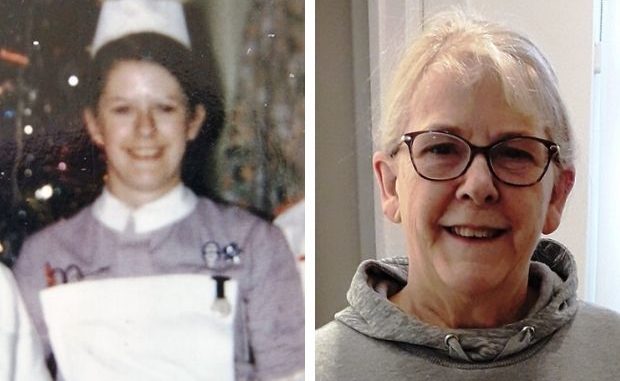
By Liz Crudgington
When Sue Dickie started her nursing training, Harold Wilson was Prime Minister, and her wages after board and lodgings were just £12, 12 shillings and 11 old pence per month.
Half a century on she is still as committed to her patients as ever, and started a new job in the Heart Centre at the Queen Elizabeth The Queen Mother Hospital in Margate just last year, aged 67.
The grandmother-of-four has no plans to hang up her uniform just yet, and says the department’s mixed-age team helps create the best experience for patients.
She said: “It is lovely to have that mix of people with different outlooks, and the patients all say they can’t thank us enough for the care and attention we showed them.
“People are worried when they arrive and we can make it a better experience for them, and that’s what makes this job worth doing.
“I do speak to some people who aren’t happy at the thought of still working past 60 or 65 but I think if you’re fit enough and your brain still works then it’s a really good way of keeping active and interested with the added bonus of the social input from colleagues.”
Sue, who lives in Broadstairs, wanted to be a nurse from the age of 11 and started training in January 1970 at the Kent and Canterbury Hospital.
She lived in nurses’ homes – often supervised by a live-in retired nurse to keep the rowdy young students in order.
When she was 19, she moved out after getting married, but had to get permission from the chief nursing officer before the wedding could go ahead.
Sue said: “It sounds strange now to think about having to ask your boss for permission to get married but that’s how it was – until you were 21 you needed parental consent as well.
“We managed to convince them that we would still be on time for work because we wouldn’t be waiting up when one of us was out late.”
After qualifying, Sue worked in an NHS home for severely disabled children in Ramsgate until her first son was born in 1976.
She returned to nursing in 1980 at Ramsgate Hospital and spent six years working nights there.
She said: “There was a real community there because it was a small hospital. You would queue up outside the night sister’s office each evening to find out where you were working that night. It was great experience.”
Another spell outside nursing followed, when Sue had her second son and focused on family life and running a video library with her husband.
When that business was sold, she worked in community homes, including one run by the Kent Association for the Blind that also offered hotel accommodation for blind people. Parties were often held in the hotel bar for all the clients.
But hospital life beckoned and Sue found herself back at the Kent and Canterbury, working as a medical secretary in the renal unit, having decided a significant back problem would prevent her returning to nursing.
She said: “That was eye-opening, I think the secretaries work harder than nursing staff, it’s constant.
“I worked for Don Prosser, who was a real old-school consultant and his letters were always about four pages long. Other consultants would write just a few paragraphs.”
By 2000, Sue was tempted back on to the wards and she completed a ‘return to nursing’ course, while working on the newly opened Birchington ward at QEQM as a healthcare assistant
She actually semi-retired last year after 18 years on Birchington ward, continuing with reduced hours on the ward while working shifts with NHS Professionals across the hospital. After working shifts with the cardiac team she successfully applied for a permanent job there, at the age of 67.
She said: “I love having the opportunity to learn new things, although it does take me longer sometimes!
“I do have hearing aids and arthritis but that isn’t who I am. I am someone who’s passionate about wanting to do new things, giving the best care I can and passionate about the NHS. My manager and my team are simply the best and could not be more supportive of me.
“In my free time I love to write and I’ve just started doing short stories. I’d really like to write song lyrics and hear them on the radio –maybe that’s something I could do when I finally do retire.”

